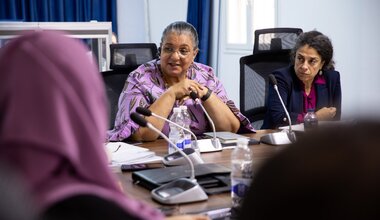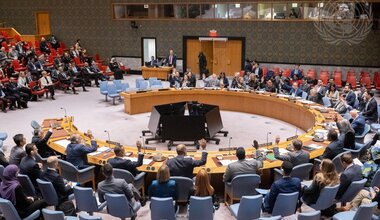Chairman’s Summary of High-Level Meeting on Libya United Nations Headquarters
New York, 25 Septembe
1. The Secretary-General of the United Nations, Mr. Ban Ki-moon, convened a high-level meeting on Libya in New York on 25 September 2014. Participants included representatives of Algeria, Argentina, Australia, Belgium, Chad, Canada, Egypt, France, Germany, Italy, Jordan, Libya, Lithuania, Luxembourg, Mali, Malta, Morocco, Niger, Norway, Portugal, Qatar, Republic of Korea, Russian Federation, Saudi Arabia, Spain, Tunisia, Turkey, United Arab Emirates, United Kingdom, United States of America, the African Union, the European Union and the League of Arab States. His Excellency Agila Saleh Essa Gwaider, President of the House of Representatives (Libya) gave an update on recent political and security developments in Libya, as well as the humanitarian situation.
2. The meeting recognised that three years since Libya commenced its democratic transition, there remain huge challenges to overcome. Participants voiced deep concern that the current political polarisation and military conflict in Libya poses a dangerous and significant threat to the country's transition, and efforts to build a modern state based on respect for human rights and the rule of law. In this regard, they called on all parties to agree to an immediate ceasefire and an end to fighting.
3. Participants condemned the targeting of civilians, including through indiscriminate shelling, as well as attacks against civilian institutions and vital installations during the conflict. They expressed their strong resolve to hold accountable all those responsible for such violations, in accordance with United Nations Security Council resolution 2174 (2014). Participants noted with alarm the growing humanitarian situation in different parts of the country, and the displacement of civilian population as a result of the fighting. They called on all parties to allow for immediate and unconditional humanitarian access to all areas.
4. Participants reaffirmed the international community's firm determination to uphold Libya's sovereignty, territorial integrity, and unity, as well as the lead role of the United Nations in coordinating international efforts to support Libya's democratic transition. Participants recognized the important efforts of Libya's neighbours and partners to promote peace and stability in Libya and took note of the President of Libya's House of Representatives support for the UN facilitated meeting on 29 September as well as the Algerian initiative to promote dialogue. They reiterated the importance of non-intervention in Libya's internal affairs.
5. In this regard, participants expressed full support for Special Representative Bernardino Leon's initiative to facilitate dialogue, commencing on 29 September. Participants also underlined the importance of resuming the political process as the only viable safeguard for Libya's democratic transition and means to ending the current conflict. They warned against the creation of parallel institutions or of de facto political realities through the use of force. They also affirmed recognition of the outcome of the 25 June 2014 general elections, and of the House of Representatives as the sole legislative authority in the country. They called on all political leaders to place Libya's national interest above all other considerations, and to work together in a spirit of inclusiveness to achieve a peaceful resolution to the political and military crisis that has engulfed Libya.
6. Participants noted that ending the current crisis in Libya can only be achieved through a political solution that upholds Libya's Constitutional Declaration and its roadmap for democratic transition, respect for the legitimacy of elected institutions, guarantees respect for human rights, is based on non-resort to the use of force in the political process, and rejects terrorism. Participants noted that any individual or entity responsible for acts designed to obstruct or undermine the successful completion of Libya's political transition will be subject to international sanction in accordance with United Nations Security Council resolution 2174 (2014).
7. Participants underscored the importance of the work of Libya's Constitutional Drafting Assembly in preparing a draft document that enshrines the rights and aspirations of all Libyan people for a modern, democratic state based on the rule of law. Participants noted the difficult circumstances under which the Constitutional Drafting Assembly was operating, and the challenges confronting its work, particularly in its ability to conduct the necessary public outreach and consultations. Participants affirmed their unequivocal support and determination to provide the Constitutional Drafting Assembly with the requisite technical assistance to enable it to make progress in its work.
8. Participants cited the growing presence and influence of radical and terrorist groups intent on exploiting the growing political and security vacuum in Libya as a major threat to the stability of Libya and the wider region, but also to international peace and security. The meeting recognised the lead role of the Government of Libya in addressing the growing threat of terrorist groups, and the readiness to support the government in this regard.
9. Participants expressed strong support for the role of the United Nations, and for the work of the United Nations Support Mission in Libya (UNSMIL), as well as for on-going mediation efforts of Special Representative Bernardino León. They called on all Libyan stakeholders to engage constructively with his efforts to facilitate a Libyan-Libyan dialogue. They also underscored the importance of all international actors working together under a coordinated approach that is UN-led.
10. Participants expressed their undeterred determination to stand by the people of Libya, and to spare no effort in supporting the country's democratic transition.
 United Nations Peacekeeping
United Nations Peacekeeping UN
UN








